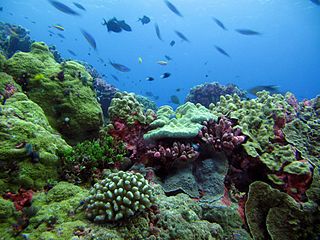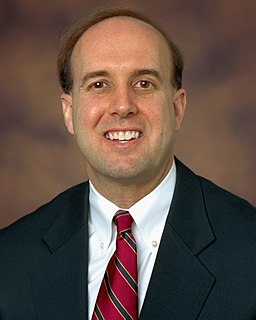
The Kyoto Protocol is an international treaty which extends the 1992 United Nations Framework Convention on Climate Change (UNFCCC) that commits state parties to reduce greenhouse gas emissions, based on the scientific consensus that (part one) global warming is occurring and (part two) it is extremely likely that human-made CO2 emissions have predominantly caused it. The Kyoto Protocol was adopted in Kyoto, Japan, on 11 December 1997 and entered into force on 16 February 2005. There are currently 192 parties (Canada withdrew from the protocol, effective December 2012) to the Protocol.
The United Nations Framework Convention on Climate Change (UNFCCC) is an international environmental treaty adopted on 9 May 1992 and opened for signature at the Earth Summit in Rio de Janeiro from 3 to 14 June 1992. It then entered into force on 21 March 1994, after a sufficient number of countries had ratified it. The UNFCCC objective is to "stabilize greenhouse gas concentrations in the atmosphere at a level that would prevent dangerous anthropogenic interference with the climate system". The framework sets non-binding limits on greenhouse gas emissions for individual countries and contains no enforcement mechanisms. Instead, the framework outlines how specific international treaties may be negotiated to specify further action towards the objective of the UNFCCC.

The United Nations Environment Programme is responsible for coordinating the UN's environmental activities and assisting developing countries in implementing environmentally sound policies and practices.

The International Union for Conservation of Nature is an international organization working in the field of nature conservation and sustainable use of natural resources. It is involved in data gathering and analysis, research, field projects, advocacy, and education. IUCN's mission is to "influence, encourage and assist societies throughout the world to conserve nature and to ensure that any use of natural resources is equitable and ecologically sustainable".

The Ramsar Convention on Wetlands of International Importance especially as Waterfowl Habitat is an international treaty for the conservation and sustainable use of wetlands. It is also known as the Convention on Wetlands. It is named after the city of Ramsar in Iran, where the Convention was signed in 1971.

The United Nations Conference on Environment and Development (UNCED), also known as the Rio de Janeiro Earth Summit, the Rio Summit, the Rio Conference, and the Earth Summit, was a major United Nations conference held in Rio de Janeiro from 3 to 14 June in 1992.

The complex politics of global warming results from numerous cofactors arising from the global economy's dependence on carbon dioxide emitting fossil fuels; and because greenhouse gases such as CO
2, methane and N
2O cause global warming.
Founded in 1966, the Pointe-à-Pierre Wild Fowl Trust is a not for profit environmental non-government organisation dedicated to environmental education and the conservation of wetlands and waterfowl. Located in Pointe-à-Pierre, Trinidad and Tobago, the trust contains two lakes and about 25 hectares within the Petrotrin oil refinery.

The United Nations Forum on Forests (UNFF) is a high-level intergovernmental policy forum. The forum includes all United Nations member states and permanent observers, the UNFF Secretariat, the Collaborative Partnership on Forests, Regional Organizations and Processes and Major Groups.

Yvo de Boer is an advisor and consultant on international environmental policy. De Boer is the former Executive Secretary of the United Nations Framework Convention on Climate Change (UNFCCC), a position he held from 2006 until 2010. A
Environmental governance is a concept in political ecology and environmental policy that advocates sustainability as the supreme consideration for managing all human activities—political, social and economic. Governance includes government, business and civil society, and emphasizes whole system management. To capture this diverse range of elements, environmental governance often employs alternative systems of governance, for example watershed-based management.

Karen Christiana Figueres Olsen is a Costa Rican diplomat with 35 years of experience in high level national and international policy and multilateral negotiations. She was appointed Executive Secretary of the UN Framework Convention on Climate Change (UNFCCC) in July 2010, six months after the failed COP15 in Copenhagen. During the next six years she worked to rebuild the global climate change negotiating process based on fairness, transparency and collaboration, leading to the 2015 Paris Agreement, widely recognized as a historical achievement.

The World Database on Protected Areas (WDPA) is the largest assembly of data on the world's terrestrial and marine protected areas, containing more than 200,000 protected areas as of October 2017, with records covering 245 countries and territories throughout the world. The WDPA is a joint venture between the United Nations Environment Programme World Conservation Monitoring Centre and the International Union for Conservation of Nature World Commission on Protected Areas.
The Earth Negotiations Bulletin(ENB) is a periodic internet news publication covering negotiations, workshops and conferences on a variety of subjects in environmental policy and international law. It is published daily in print and online forms, and with email, Facebook and Twitter feeds, during conferences of the parties to multilateral environmental agreements; and is a publication of the Reporting Services division of the International Institute for Sustainable Development. The publication and division are based in New York City.

The International Institute for Sustainable Development (IISD) is an independent think tank founded in 1990. The institute has offices in Winnipeg, Ottawa, New York City, and Geneva. It has over 100 staff and associates working in over 30 countries.
Global Environmental Governance is the title of a book written by Adil Najam, Mihaela Papa and Nadaa Taiyab. All the information of this article comes from this book.
The contributions of women in climate change have received increasing attention in the early 21st century. Feedback from women and the issues faced by women have been described as "imperative" by the United Nations and "critical" by the Population Reference Bureau. A report by the World Health Organization concluded that incorporating gender-based analysis would "provide more effective climate change mitigation and adaptation."

Nature-based solutions (NBS) refers to the sustainable management and use of nature for tackling socio-environmental challenges. The challenges include issues such as climate change, water security, water pollution, food security, human health, and disaster risk management.

Robert K. Dixon is an energy, environment, and economic expert at the Office of International Affairs, US Department of Energy headquarters in Washington, DC, USA.
Ecosystem-based adaptation (EBA) encompasses a broad set of approaches to adapt to climate change. They all involve the management of ecosystems and their services to reduce the vulnerability of human communities to the impacts of climate change. The Convention on Biological Diversity defines EbA as “the use of biodiversity and ecosystem services as part of an overall adaptation strategy to help people to adapt to the adverse effects of climate change”.












